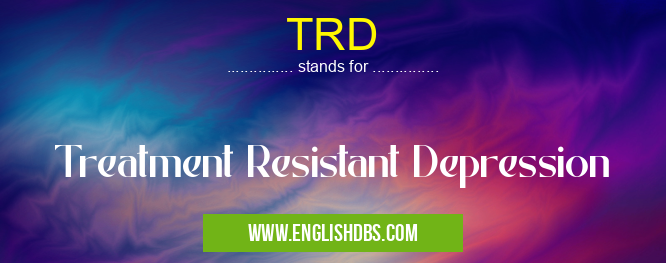What does TRD mean in PHYSIOLOGY
Treatment Resistant Depression (TRD) is a medical term that is used to describe a type of depression that does not respond to traditional forms of treatment, such as therapy or medications. It is estimated that around 15-30% of people with depression may suffer from TRD, making it a very real and difficult condition for many individuals. TRD is characterized by persistent and debilitating symptoms of depression such as low mood, loss of pleasure in activities, changes in eating and sleeping patterns, feelings of hopelessness or helplessness, and sometimes suicidal ideation. Fortunately, advancements in treatments and research have given us more options than ever before for managing this disorder.

TRD meaning in Physiology in Medical
TRD mostly used in an acronym Physiology in Category Medical that means Treatment Resistant Depression
Shorthand: TRD,
Full Form: Treatment Resistant Depression
For more information of "Treatment Resistant Depression", see the section below.
» Medical » Physiology
Definition
TRD stands for Treatment Resistant Depression, which is defined as a type of depression that fails to respond to conventional treatments such as antidepressants or psychotherapy. People with TRD often experience persistent and severe symptoms of depression such as low mood, loss of interest in activities once enjoyed, changes in sleep/eating patterns, feelings of helplessness or hopelessness, and in some cases thoughts about suicide.
Causes
The exact cause(s) behind TRD is still unknown however there are various theories being explored by the scientific community. It has been suggested that genetic factors could play a role along with environmental ones such as stressors or lifestyle choices (e.g., diet). How an individual’s brain chemistry responds to traditional forms of treatment can also be an important factor in determining why some people don’t respond well to certain therapies or medications.
Treatment
Fortunately, there are now several effective treatment approaches for TRD including more intensive forms of psychotherapy such as cognitive-behavioral therapy (CBT), medication combinations (e.g., two different antidepressant types taken together), electroconvulsive therapy (ECT), transcranial magnetic stimulation (rTMS), and ketamine infusions. Treatments should always be discussed between the patient(s) involved and a qualified medical professional before any decisions are made by either party.
Essential Questions and Answers on Treatment Resistant Depression in "MEDICAL»PHYSIOLOGY"
What is Treatment Resistant Depression?
Treatment Resistant Depression (TRD) refers to a type of depression that does not respond to regular treatments such as antidepressants, lifestyle changes, or psychotherapy. Individuals with TRD experience longer and/or more severe episodes of depression that may last for months or even years.
What are the symptoms of Treatment Resistant Depression?
Symptoms of TRD include feeling depressed most of the day or for extended periods of time, losing interest in activities that were once pleasurable, difficulty sleeping, and fatigue. Other common signs may include feelings of worthlessness or hopelessness, low moods and energy levels, inability to concentrate and focus, decreased appetite, slowed movement and thinking, and suicidality.
Does Treatment Resistant Depression require medical treatment?
Yes. It is important to seek professional medical help if you are experiencing symptoms of TRD as these may indicate greater health risks than typical depression. Additionally, some individuals with TRD may benefit from a combination of medications, lifestyle changes, talk therapy, cognitive behavioral therapy (CBT), or other forms of psychotherapy.
How long does it take for treatment for Treatment Resistant Depression to take effect?
It varies depending on the individual's response to treatment but typically it takes about one-two weeks for antidepressants to begin their effects. It can take upwards of two months before a person experiences optimal results from antidepressant medication.
Are there any side effects associated with taking medication for Treatment Resistant Depression?
Yes. Antidepressant medications can cause a variety of side effects including nausea, weight gain or loss, restlessness or agitation; sexual difficulties; dry mouth; headache; sweating; blurred vision; insomnia; constipation; dizziness; drowsiness; anxiety; increased heart rate; difficulty concentrating/thinking; tremors and other physical sensations such as pins-and-needles feelings.
Is it possible to treat Treatment Resistant Depression without medication?
Yes! Certain lifestyle changes including exercising regularly (around 30 minutes per day), getting enough sleep (at least 7 hours per night), maintaining healthy eating habits and avoiding alcohol/substance abuse can be helpful in alleviating symptoms of TRD independently or in conjunction with psychotherapies such as cognitive behavior therapy (CBT). Other natural treatments such as yoga and mindfulness techniques have also been found beneficial for many individuals suffering from this condition.
What type of talk therapy is used to treat Treatment Resistant Depression?
Cognitive Behavioral Therapy (CBT) is commonly employed by mental health professionals in treating individuals with TRD as it helps patients identify patterns in their thinking which can lead them towards unhelpful thoughts and behaviors that contribute to their symptoms. Additionally CBT teaches them skills like problem-solving which they can use when facing difficult situations in everyday life.
How is electroconvulsive therapy used in treating Treatment Resistant Depression?
Electroconvulsive Therapy (ECT) is sometimes prescribed when other treatments have failed or when they cannot wait any longer for drug treatments to take effect due to life-threatening symptoms such as suicidal ideation.. The treatment involves sending a small electric current through the brain via electrodes placed on the scalp which will induce seizures under general anesthesia. This form of treatment has been found effective in quickly alleviating severe depressive symptoms but should only be done under careful supervision by a qualified psychiatrist.
Final Words:
For those living with Treatment Resistant Depression, it can be difficult to cope with the persistent chronic nature of its symptoms. It is important to remember however that there are effective treatments available today for managing this disorder; these include a variety of psychotherapies, medication combinations, electroconvulsive therapy (ECT), transcranial magnetic stimulation (rTMS), and ketamine infusions among other approaches that could help someone who is struggling with this condition get better over time. With the right support system around them consisting of family/friends/medical professionals - anyone suffering from TRD can find their way back to leading a happy life.
